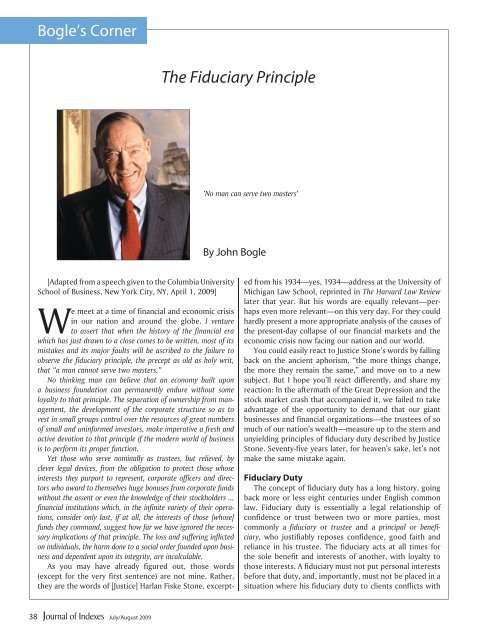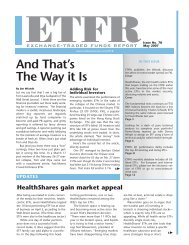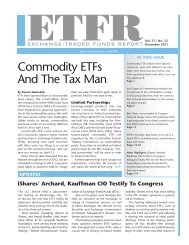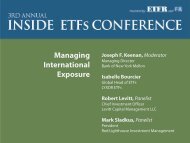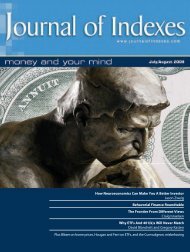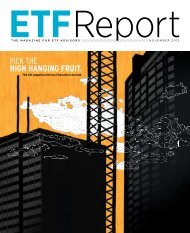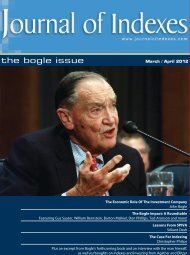How to Kill a Black Swan Remy Briand and David Owyong ...
How to Kill a Black Swan Remy Briand and David Owyong ...
How to Kill a Black Swan Remy Briand and David Owyong ...
Create successful ePaper yourself
Turn your PDF publications into a flip-book with our unique Google optimized e-Paper software.
Bogle’s Corner<br />
The Fiduciary Principle<br />
‘No man can serve two masters’<br />
By John Bogle<br />
[Adapted from a speech given <strong>to</strong> the Columbia University<br />
School of Business, New York City, NY, April 1, 2009]<br />
We meet at a time of financial <strong>and</strong> economic crisis<br />
in our nation <strong>and</strong> around the globe. I venture<br />
<strong>to</strong> assert that when the his<strong>to</strong>ry of the financial era<br />
which has just drawn <strong>to</strong> a close comes <strong>to</strong> be written, most of its<br />
mistakes <strong>and</strong> its major faults will be ascribed <strong>to</strong> the failure <strong>to</strong><br />
observe the fiduciary principle, the precept as old as holy writ,<br />
that “a man cannot serve two masters.”<br />
No thinking man can believe that an economy built upon<br />
a business foundation can permanently endure without some<br />
loyalty <strong>to</strong> that principle. The separation of ownership from management,<br />
the development of the corporate structure so as <strong>to</strong><br />
vest in small groups control over the resources of great numbers<br />
of small <strong>and</strong> uninformed inves<strong>to</strong>rs, make imperative a fresh <strong>and</strong><br />
active devotion <strong>to</strong> that principle if the modern world of business<br />
is <strong>to</strong> perform its proper function.<br />
Yet those who serve nominally as trustees, but relieved, by<br />
clever legal devices, from the obligation <strong>to</strong> protect those whose<br />
interests they purport <strong>to</strong> represent, corporate officers <strong>and</strong> direc<strong>to</strong>rs<br />
who award <strong>to</strong> themselves huge bonuses from corporate funds<br />
without the assent or even the knowledge of their s<strong>to</strong>ckholders ...<br />
financial institutions which, in the infinite variety of their operations,<br />
consider only last, if at all, the interests of those [whose]<br />
funds they comm<strong>and</strong>, suggest how far we have ignored the necessary<br />
implications of that principle. The loss <strong>and</strong> suffering inflicted<br />
on individuals, the harm done <strong>to</strong> a social order founded upon business<br />
<strong>and</strong> dependent upon its integrity, are incalculable.<br />
As you may have already figured out, those words<br />
(except for the very first sentence) are not mine. Rather,<br />
they are the words of [Justice] Harlan Fiske S<strong>to</strong>ne, excerpted<br />
from his 1934—yes, 1934—address at the University of<br />
Michigan Law School, reprinted in The Harvard Law Review<br />
later that year. But his words are equally relevant—perhaps<br />
even more relevant—on this very day. For they could<br />
hardly present a more appropriate analysis of the causes of<br />
the present-day collapse of our financial markets <strong>and</strong> the<br />
economic crisis now facing our nation <strong>and</strong> our world.<br />
You could easily react <strong>to</strong> Justice S<strong>to</strong>ne’s words by falling<br />
back on the ancient aphorism, “the more things change,<br />
the more they remain the same,” <strong>and</strong> move on <strong>to</strong> a new<br />
subject. But I hope you’ll react differently, <strong>and</strong> share my<br />
reaction: In the aftermath of the Great Depression <strong>and</strong> the<br />
s<strong>to</strong>ck market crash that accompanied it, we failed <strong>to</strong> take<br />
advantage of the opportunity <strong>to</strong> dem<strong>and</strong> that our giant<br />
businesses <strong>and</strong> financial organizations—the trustees of so<br />
much of our nation’s wealth—measure up <strong>to</strong> the stern <strong>and</strong><br />
unyielding principles of fiduciary duty described by Justice<br />
S<strong>to</strong>ne. Seventy-five years later, for heaven’s sake, let’s not<br />
make the same mistake again.<br />
Fiduciary Duty<br />
The concept of fiduciary duty has a long his<strong>to</strong>ry, going<br />
back more or less eight centuries under English common<br />
law. Fiduciary duty is essentially a legal relationship of<br />
confidence or trust between two or more parties, most<br />
commonly a fiduciary or trustee <strong>and</strong> a principal or beneficiary,<br />
who justifiably reposes confidence, good faith <strong>and</strong><br />
reliance in his trustee. The fiduciary acts at all times for<br />
the sole benefit <strong>and</strong> interests of another, with loyalty <strong>to</strong><br />
those interests. A fiduciary must not put personal interests<br />
before that duty, <strong>and</strong>, importantly, must not be placed in a<br />
situation where his fiduciary duty <strong>to</strong> clients conflicts with<br />
38<br />
July/August 2009


